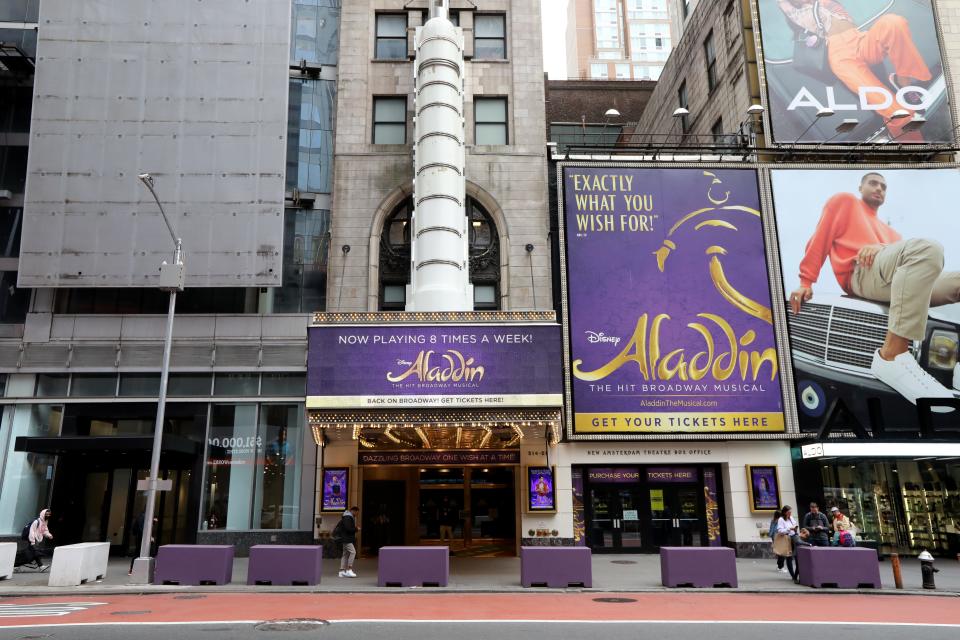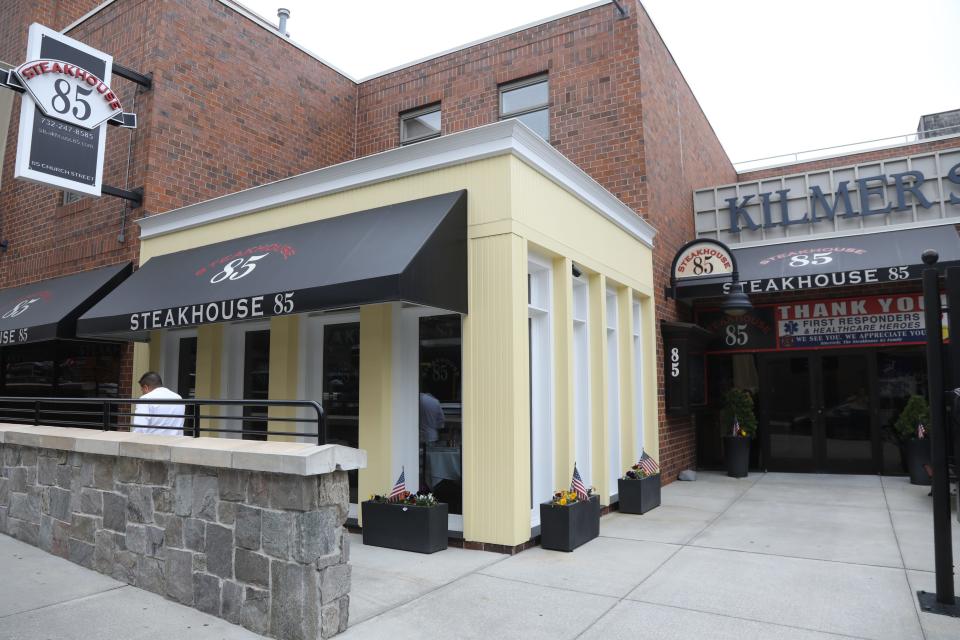As debt soars, Rutgers athletics drops millions on credit cards for steaks, Disney, Broadway
A luau and beach yoga at sunset in Hawaii. A guided snorkeling tour in Puerto Rico. Ax throwing in Texas. Tickets to Disney World and Broadway shows. Luxury hotels in Paris and London. Chilled lobster, seafood towers and Delmonico steaks back home in New Brunswick.
Even as Rutgers University athletics continues to run up tens of millions of dollars in annual operating deficits, it shows little restraint when spending on extravagances for its athletes, coaches and recruits.
A review by NorthJersey.com and the USA TODAY Network New Jersey of more than five years of credit card charges by the athletics division — more than 30,000 purchases totaling nearly $10 million — provides a unique glimpse into the cost of competing in big-time college athletics.
Those costs, all charged on Rutgers credit cards, range from a $31,000 beach party evening to $20,000 for a bowling outing and $85 per person to savor a tasting menu at an upscale Manhattan restaurant.
NorthJersey.com’s review also reveals that Rutgers athletics uses the cards more freely than some other university departments, and its record-keeping of spending by coaches and staff has been spotty, with gaps in oversight.

Beyond paying for the trappings of big-time college athletics — from high-end sportswear to thrones that potential recruits can pose on for photo ops — Rutgers coaches and staff also use the cards to buy equipment and supplies for their teams without needing advance approval. And there are puzzling charges — such as paying Best Buy for technical support instead of going to the school’s IT or maintenance departments, a recent payment to an Australian debt collector, and athletics division nutritionists buying hundreds of boxes of Girl Scout cookies and copious amounts of Kentucky Fried Chicken.
Meanwhile, Rutgers athletics has been accumulating the biggest deficits in major college sports — even as professors have been furloughed and some students struggling to cover expenses make use of a food pantry on campus. The university’s board of trustees just approved a 2.9% tuition increase for in-state students for the coming year, and tuition and fees have risen by 24% since 2012.
The past two years saw the biggest operating losses yet for Rutgers athletics, totaling $146 million. The university has covered those athletics losses using taxpayer money and revenue from student fees and tuition.
Athletics has been borrowing heavily against its future. The university has lent athletics a combined $84 million to cover budget shortfalls since Rutgers began Big Ten play in 2014, and the Big Ten lent it another $48 million. It could get a windfall in coming years when the Big Ten, which is expanding into Southern California by adding UCLA and USC, signs a new TV deal that some media outlets say could bring in more than $100 million per team.
But experts say college athletics divisions often spend whatever revenues they receive — and more — on new facilities, higher coaches’ salaries and a wide range of indulgences to keep up with competing schools. And even during the height of the pandemic, in fiscal 2020-21,when some games were canceled and ticket revenues were wiped out, Rutgers was the only school in the Big Ten Conference to increase athletics spending.
The credit card charges reviewed for this story represent only a fraction of athletics’ overall spending. It is also only a partial picture of credit card use, because Rutgers failed to provide all charges in response to NorthJersey.com’s public records requests. The university said it would provide missing charges months ago, but it did not.
Despite the missing data, Rutgers records reveal a pattern in which coaches and athletics staff use credit cards not only for expenses incurred when on the road competing and recruiting, but for thousands of local charges at nearby restaurants, supermarkets, pharmacies, coffee shops and big-box stores near campus in New Jersey.
They use the cards to make purchases that will impress recruits and entertain student-athletes.
They also use them to buy furniture, paint and other routine items — expenditures that would typically go through a central purchasing office at Rutgers.
There is a lack of clarity about rules that apply to athletics credit cards. The university has two kinds of cards — for travel and purchasing — each with its own set of rules. Athletics initially said most of its cards are travel cards and list all but two of the cards that way in documents provided to NorthJersey.com. But after months of questioning, athletics said last week that its cards are a hybrid — used for both travel and purchasing.
'Unsustainable':How Rutgers athletics quietly racked up $265M in debt
Deficit:Rutgers athletics rang up a $73M deficit last year. Students, taxpayers were on the hook
In addition to reviewing individual credit card purchases by athletics from January 2017 through March of this year, NorthJersey.com sought backup documentation for more than 120 of those charges through records requests, some of which took months to be processed.
The investigation found that:
●Oversight is lax and the reasons for credit card charges are often undocumented. Former women’s basketball coach C. Vivian Stringer’s card was used more than 200 times after she went on a paid leave of absence last year, and Rutgers only noticed seven months later, in November. Athletics said the card was being used by a member of the coaching staff for team-related purchases. It was used again as recently as March. In addition, Rutgers can’t always provide documents showing the reason for charges by coaches and staff, including for meals that cost thousands of dollars each. In some cases, receipts were missing or did not indicate what was purchased.
●Athletics routinely skirts university guidelines on purchasing. Coaches and staff regularly use the credit cards to pay for products and services that never appear on a university purchase order. The division says it doesn’t have to buy from the university’s approved sellers, and credit card purchases do not require advance approval. Over five years, more than 80 charges for goods and services exceeded the university’s published limits — although athletics said it may change those restrictions whenever it chooses.
●The credit cards show spending contrary to the spirit of NCAA rules. Meals for recruits include nearly $240 per person on steak and lobster dinners, while NCAA rules require such meals to be comparable to what student-athletes normally eat. Experts say Rutgers is not alone in its generous interpretation of this rule. Rutgers athletics spent $18,000 at Steakhouse 85 in New Brunswick one night recently for a meal that featured chilled lobster, seafood towers, Delmonico steaks and bananas foster. Athletics said it was a recruiting event for 75 people — though it had no documents showing the purpose of the meal.
●Rutgers treats Manhattan as its extended campus. Athletics has taken prospective athletes on a bowling trip to Times Square that cost more than $20,000; to Broadway shows such as “Aladdin”; to upscale restaurants such as Buddakan, where nearly a dozen people enjoyed $85-per-person tasting menus; and to routine stops at a bakery made famous on the TV show “Cake Boss.” Those trips push the limits of what the NCAA allows for recruiting visits, which are restricted to a 30-mile radius around campus. Portions of the Rutgers campus are just within 30 miles of parts of midtown Manhattan. Not all the city trips are for recruiting — Rutgers’ swim coach took a job candidate to a celebrity chef’s restaurant and went on a retreat with two assistants that included a hotel stay and a meal at a French restaurant in the West Village.
●Athletics has charged millions of dollars for food when coaches and staff are home. They have averaged more than two charges a day at restaurants in New Jersey, many close to campus. The division has spent $180,000 alone at Steakhouse 85 in New Brunswick in the past five years to impress recruits and treat athletes and others — even for takeout during the pandemic. Athletics has also charged hundreds of thousands of dollars for meal kits and pre-made meal delivery services. And in addition to the credit card charges, the division buys food from local restaurants through the university’s regular purchasing system and has spent nearly $400,000 over the last year on DoorDash orders for football players.
●The division spends hundreds of thousands of dollars to entertain student-athletes. The baseball team’s spring break trip to play the University of Hawaii featured a luau that cost at least $4,500, as well as sunset beach yoga. The swim and diving team has regular preseason practices in Puerto Rico and in California, where it spent $7,000 on a gourmet chef. Rutgers coaches and athletes have gone ax throwing in Texas and horseback riding in Colorado, and visited Disney World in Florida and Candytopia in Philadelphia, a candy-themed entertainment center. Athletics has dropped more than $120,000 at Topgolf in Edison over the past five years and tens of thousands more on bowling, a trampoline park and sporting events.
●Rutgers pays for coaches to travel the world. Rutgers’ head swimming coach charged for hotels in Europe when he was an assistant with the Czech Republic national team during the 2019 World University Games. Two Rutgers students and one graduate participated in the games — but weren’t competing for the university. Two were members of the Czech team and one represented Italy. Rutgers said international travel by coaches occurs routinely in college athletics for recruiting, and documents show coaches traveling to France, Spain, Thailand, St. Thomas and Italy for that purpose. However, some hotel stays — in Italy, England, Scotland and Norway — did not have paperwork specifying the reason for the trips.

●Athletics invests in pricey retreats and events. Rutgers said $18,000 paid to the Grand Cascades Lodge at Crystal Springs in Sussex County several years ago was for a senior leadership retreat attended by donors that included training sessions. Receipts showed payments for two nights of lodging for nearly 20 people and an open bar operating for two hours during each of the two days of the event. Nearly $31,000 was charged at the Ocean Place Resort in Long Branch last year for what athletics called a “large-scale recruiting event.” It included a buffet, a beach party and a cocktail reception for 200 people. Available documents didn’t show the purpose of either of the events or who attended.
Using 'common sense'
In addition to the individual credit card charges, from the middle of 2019 through January of this year Rutgers placed $4 million on debit cards for athletes and coaches for day-to-day expenses while traveling, a period of 2½ years for which Rutgers provided documents. Rutgers failed to provide reports showing how the debit cards were used. The records office at first cited student privacy for denying the records, and later said they did not exist, although athletics said it has access to such records.
Also unexplained are years of expenses for Rutgers head football coach Greg Schiano, who makes a base salary of $4 million annually. He does not have a credit card, the university said, and only one of his top coaching assistants is listed in documents as having an active card. Rutgers initially said Schiano had no expense reimbursements at all. Then it sent documents showing he was last reimbursed two years ago — when he bought some postage stamps. In response to a subsequent records request by NorthJersey.com in June, Rutgers provided records showing $5,000 in expenses since January by Schiano for recruiting and a Big Ten meeting. It’s not clear why there is a two-year gap in available records.
And among the credit card activity Rutgers failed to provide were charges made by Athletics Director Pat Hobbs’ executive assistant — who had one of only two cards designated for purchasing rather than travel on a list of athletics credit cards provided by the university. The remainder were listed as travel cards.
Rutgers answered numerous questions about the charges in writing — but didn’t answer all of them completely and refused requests for interviews. The athletics division also did not take the opportunity to comment about the need for various expenses or to put them in context with its move to the Big Ten and into big-time athletics.
COVID: Other Big 10 schools slashed athletics spending during pandemic. Rutgers did not
More debt: Amid Rutgers football ticket revenue woes, school plans $150 million training complex
While universities often pay for athletes to be entertained or to participate in team-building exercises, Rutgers has depended more than any other public university in a major sports conference over the past few years on a cash infusion from taxpayers — along with student tuition and fees — to cover its losses.
Experts said it is common for colleges participating in major-college sports to entertain prospective recruits and take them out for pricey dinners, and that NCAA guidelines for meals — once considered overly burdensome — have been relaxed. Now there are no set limits on how much may be spent on recruiting meals, even though NCAA guidelines say they should be similar to what student athletes would eat each day.
“Most of these universities are pretty adept at explaining their way around these things,” said David Ridpath, who teaches sports business at Ohio University and is an expert on the NCAA. “It’s really up to the institution to police itself.”
Don Buffum, chief procurement officer at Mississippi State University, said his school takes athletes out for bowling and other entertainment, and doesn’t place limits on meals. But he said he hasn’t seen “unlimited steak and lobster,” and it’s up to coaches to use “common sense.”
“The general philosophy is we’re stewards of the public’s dollar,” Buffum said. “What I see is that people are embarrassed to turn in receipts that are excessive. They know someone is looking at them on a regular basis.”
Rutgers athletics says all its credit card purchases are carefully scrutinized.
“There is a dedicated group in the athletics business office that reviews charges and supporting documentation on an ongoing basis,” a Rutgers athletics spokesman said in an email.

Investigative reporter Abbott Koloff can be reached at koloff@northjersey.com. Investigative reporter Jean Rimbach can be reached at rimbach@northjersey.com.
This article originally appeared on USA TODAY: Rutgers athletics drops millions on credit card purchases, debt soars

